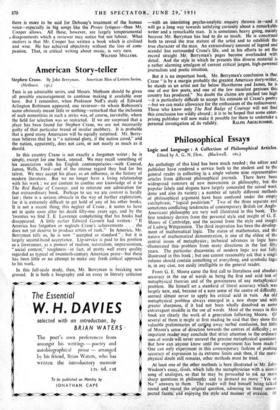American Story-teller
Stephen Crane. By John Berryman. American Men of Letters Series.
(Methuen. I is.) Tics is an admirable series, and Messrs. Methuen should be given all possible encouragement to continue making it available over here. But I remember, when Professor Neff's study of Edward Arlington Robinson appeared, one reviewer—to whom Robinson's name obviously meant little or nothing—remarked that the inclusion of such nonentities in such a series was, of course, inevitable, where the field for selection was so restricted. If we are surprised that a place has been found for Stephen Crane, we are not necessarily guilty or that particular brand of insular snobbery. It is probable that a good many Americans will be equally surprised. Mr. Berry- man believes that he is "a national glory, if the nation cared," and the nation, apparently, does not care, or not nearly as much as it should.
In this country Crane is not exactly a forgotten writer ; he is simply, except for one book, unread. We may recall something of his association with his English contemporaries—with Conrad, James, Wells, Ford—and of the intense regard they had for his talent. We may accept his place, as an influence, in the history of modern literature. But we no longer have a living relationship with his work ; we are content to confine our knowledge of it to The Red Badge of Courage, and to reiterate our admiration for that extraordinary book. Perhaps to say we are content is hardly fair ; there is a serious obstacle in the way of further exploration, for it is extremely difficult to get hold of any of his other books. It is not a recent thing, this neglect of Crane, it seems to have set in quite soon after his death fifty-one years ago, and by the 'twenties we find T. E Lawrence complaining that his books had disappeared. A little earlier Edward Garnett had written: " If America has forgotten or neglects Crane's achievements . . . she does not yet deserve to produce artists of rank." In America, Mr. Berryman tells us, he is now "accepted as standard" ; but it is largely second-hand acceptance. Lip-service is paid to his position as a forerunner, as a pioneer of realism, naturalism, impressionism, "social content." toughness -in' fact, of pretty well every quality regarded as typical of twentieth-century American prose—but there has been little or no attempt to make any fresh critical approach to his work.
In this full-scale study, then, Mr. Berryman is breaking new ground. It is both a biography and an essay in literary criticism
—.with an interesting psycho-analytic enquiry thrown in—and it will go a song way towards satisfying curiosity about a remarkable writer and a remarkable man. It is sometimes heavy going, mainly because Mr. Berryman has had to do so much. He is concerned both to reveal the true stature of the artist and to establish the true character of the man. An extraordinary amount of legend and scandal has surrounded Crane's life, and in his efforts to set the record straight Mr. Berryman's pages become overloaded with detail. And the style in which he presents this diverse material is a rather alarming amalgam of current critical jargon, high-powered journalism and poetic intuition.
But it is an important book. Mr. Berryman's conclusion is that Crane "is by a margin probably the greatest American story-writer, he stands as an artist not far below Hawthorne and James, he is one of our few poets, and one of the few manifest geniuses this country has produced." No doubt the claims are pitched too high —it is particularly difficult to accept his estimate of Crane's poetry —but we can make allowance for the enthusiasm of the rediscoverer. Those who know only The Red Badge of Courage will not find this conclusion too wildly absurd ; it is to be hoped that some enter- prising publisher will now make it possible for them to undertake a
personal investigation of its validity. RALPH ABERCROMBIE.


































 Previous page
Previous page